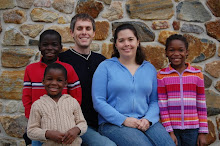After the second day of the conference, I knew I had a target on my back because of Worldlink’s mission. One of the men who worked in the housekeeping department of the hotel stopped me, asked for my card, and told me briefly about the ministry he is involved with to street children in
It was very hard to hear about the needs and know that neither I nor Worldlink had the resources to meet them. Even harder was not being able to meet them when I had the resources, as in the case of Timothy, a brother from
I encountered three types of people at the conference. The first type was there trolling for funds, despite the admonition of the organizer not to seek short term benefit at the expense of a long term relationship. It is hard if you see this as your only opportunity to get your message out and make your request. I probably saw more of this than anyone once word got around about what I did.
The second type was also interested in partnerships (funding), but came from a less desperate place. It is hard to describe what I mean by that, but these people were genuinely interested in conversation with me, not simply selling me something. The ones that I was most impressed by also seemed to be the ones who did not ask or only did so in a peripheral way. These people came with honest questions above their needs and interests (Paul Vivire, Jessy Togba-Doya, Ronald Nalera).
The third type primarily came from outside the region or from larger churches in the area. They came for the conversation, perhaps seeking partnerships, but primarily driven by the desire to be there, hear the questions, and hopefully some answers. Of course, many more questions were raised than answered.
I had been asked by the organizer to lead a discussion on International Partnerships. The workshop was Thursday, near the end of the conference. It was well received, though it ran long because of the good discussions. Even though I kept telling people they should leave and have tea (Africans love their tea time – every morning and afternoon), most stayed until the end, and 12 or so asked for copies of the presentation.
I think the most helpful part of the discussion was the concluding section which covered how to write a proposal for funding. This came out of a conversation I had the day before with a great minister from rural
It was a little disappointing to see only about 5 Westerners in the workshop, especially since the only other option was on “funding your ministry.” I know some folks from





2 comments:
Peter - I guess I'm left with a big ? What do I pray for? What do they need most? How are you praying? What do I need to know that I don't know?
Any thoughts?
Alanna (and everyone),
This is a great question. I won't claim to have the answers but here are what I see to be biggest needs for Africa.
1. Integrity - The unfortunate reality is that there is an enormous amount of corruption across the continent. The reasons for this are varied, but poverty is a big one my African friends bring up when I ask their opinion. Consequently, people who have opportunities to gain, even at the expense of their countrymen, do. Leaders at all levels need to model and preach the overall benefits of cooperation and integrity rather than selfishness.
2. Forgiveness - So many places have experienced conflict in struggles for power after the colonial powers left or due to ethnic tensions (thanks in large part to colonial policies). People need to forgive and stop seeking to dominate or punish their neighbors.
3. The presence of God's Holy Spirit - This is the biggie and without it the first two won't happen. The continent of Africa is a spiritual battlefield. Islam is making a huge push and is backed by Arab oil money. Traditional tribal religious practices are still alive and well in many parts of the continent.
4. Find out what is going on now, and pray for that. Maybe I can post more on this topic, but for now check out www.irinnews.org. for daily news reports from Africa and Asia.
Post a Comment